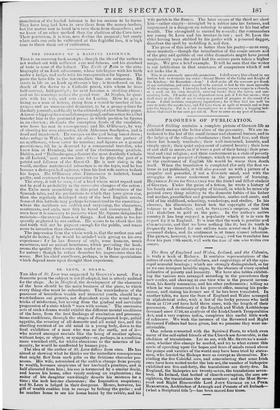PROGRESS OF PUBLICATION.
Heinrich Stilling contains a complete picture of German life as exhibited amongst the better class of the peasantry. We are in- troduced to the hut of the small farmer and charcoal-burner, and to the lodgiag of the village schoolmaster ; their hard fare, and their clean but homely wardrobe; their well-instructed, humble, and simple spirit; their quiet enjoyment of natural beauty; their love of and skill in music, as it' it were a part of their being; their prac- tical and vital religion ; and their contentment in a state of poverty without hope or prospect of change, which to persons accustomed to the excitement of English life would be worse than death itself. When the translation is completed (for only the first vo- lume is yet published), it will also present us with a picture of a singular and powerful, if not a first-rate mind, and with the struggles its owner underwent in the pursuit of learning. HEINRICH JUNG (or STILLING) was the friend and fellow student of GOETHE. Under the guise of a fiction, he wrote a history of his family and an autobiography of himself', in which he minuiely painted every thing relating to the domestic habits of his father and mother, grandfather and grandmother, uncles and aunts, and told of his childhood, schooling, wanderings, and studies. In his absence, his illustrious friend took the copyright of the first vulpine to a bookseller, and, to STILLING 'S surprise, sent him 115 rixdollars in gold as the price. In the author's native country it has long enjoyed a popularity which it is in vain tta expect for it in England. It is true that the work is peculiar and chat actesistie, and that we have nothing like it; but its truth is frequently too literal for our callous taste accustomed to high- seasoned dishes, and its sentiment is at times almost infantine. The picture, however, is worth examinieo; ; snd time translator has dune his part with spirit, a tod with the zusi. of one oho writes COM amore.
























 Previous page
Previous page